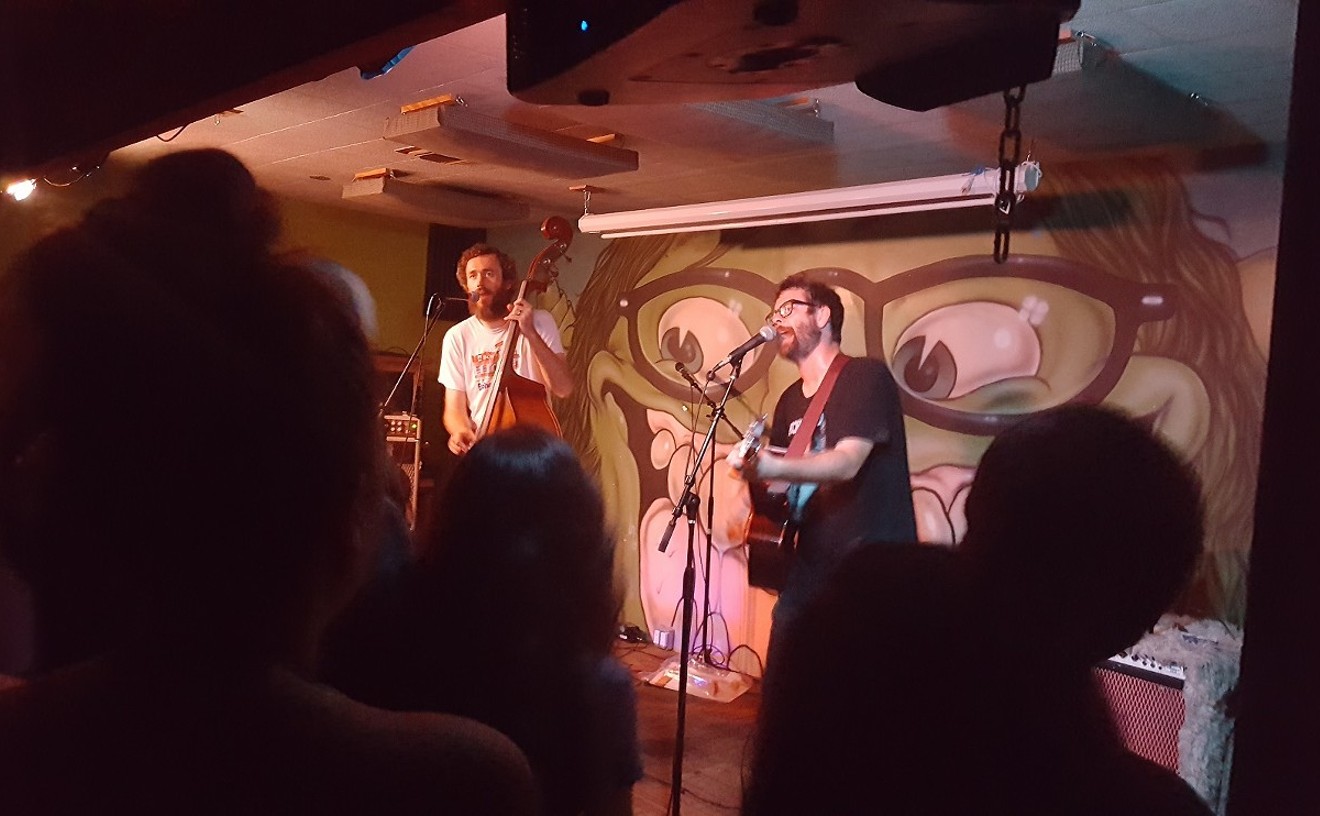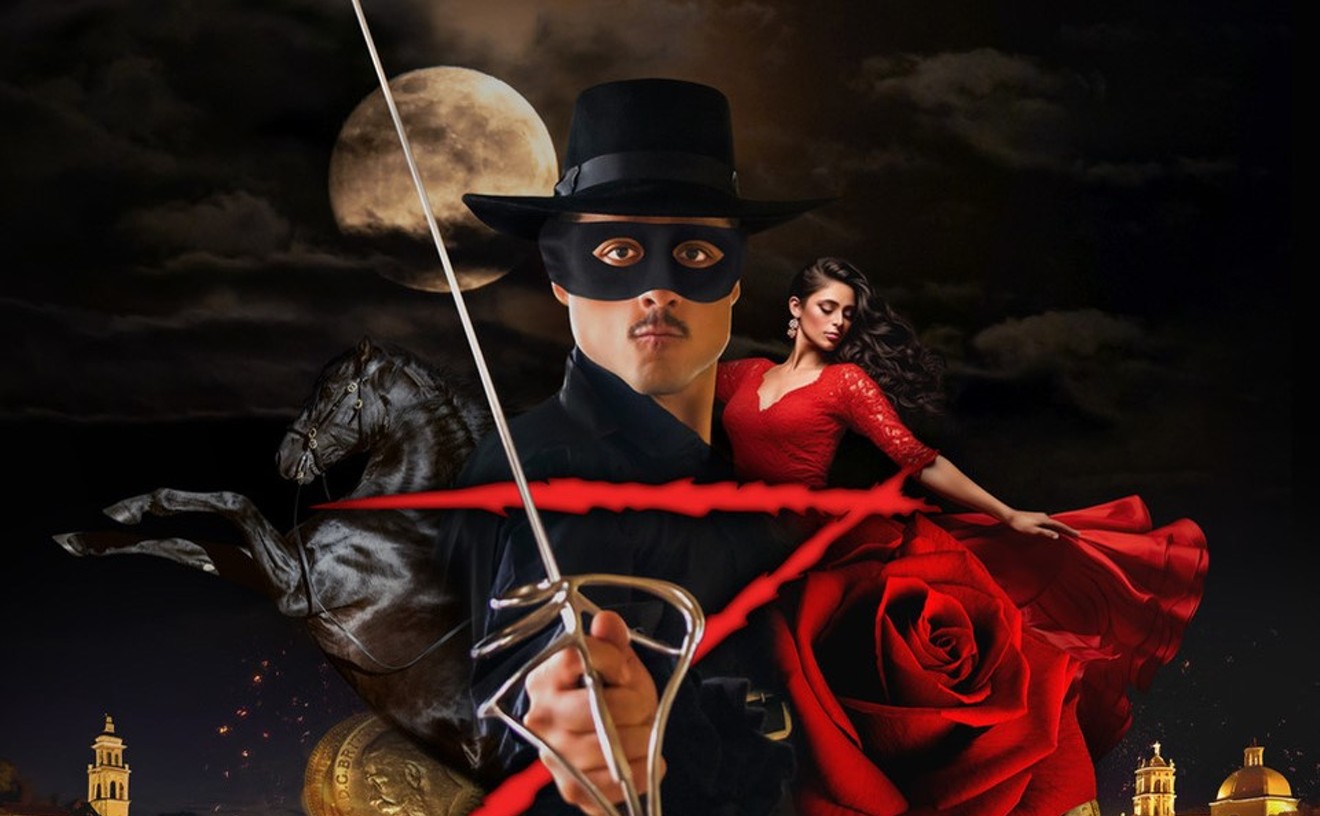If everyone's a photographer these days thanks to the iPhone, then maybe everyone's a writer, too, considering the prevalence of blogs, personal platforms, and 140-character Twitter observations. The Second Annual Arizona Writer's Conference, held at Wilkes University in Mesa on November 13 and 14, taps into the creativity. The two-day event features workshops and panels aimed at encouraging budding writers, be they poets, screenwriters, or would-be novelists.
Last year's inaugural conference took place in mid-December, a venture that was somewhat hurried in planning and drew about 40 attendees. The event was still considered a success, says coordinator Jeremiah Blue, an internationally recognized slam poet who has been an active participant in the state's writing scene for nearly a decade. Thanks to partnerships with Valley writing and storytelling organizations, like Phonetic Spit and Dan Hull of Storyline, and presentations from groups including BlackPoet Venture and First Friday Night Live, Blue expects attendance to increase.
The conference begins with an open mic on Friday, November 13, followed by a poetry and spoken-word slam. Workshops begin at 9 a.m. on Saturday, November 14, and cover topics like "How to Break into Film," led by filmmakers Ross Klavan and Richard Uhlig; "Writing the Novel," with Jeff Talarigo, Wilkes professor and author of The Pearl Diver and The Ginseng Hunter; and "Storytelling Secrets," a how-to for live speaking with Dan Hull, award-winning teller and the man behind Storyline at Space 55 and Yarnball at Lawn Gnome. Other topics include finding an agent and e-publishing, among others.
"Conferences offer something beyond education and training; they offer exposure to a community," says Blue, who is also the event director for the Copper State Poetry Slam. "Groups like Storyline and Phonetic Spit are contributing to the transformation and sustainability of all writing in the Phoenix area. It's groups like these that offer a much needed and desired opportunity to explore various forms of writing, as well as the presentation of that writing on a stage.
"Phoenix is developing in many aspects, and the art and writing culture of the area is certainly among those. When organizations such as Storyline, Phonetic Spit, AZ Poetry Society, BlackPoet Ventures, Lawn Gnome Books and Publishing, Infuse Open Mic, or First Friday Night Live, expand and grow their audiences, they are contributing to the development and opportunities that exist for all writers. Each of them have their own focus, which they work hard to sustain, but they also offer inspiration and motivation to other genres of writers to find new experiences, outlets, or chances to develop their own vision."
Though the conference is about writing across all genres and is geared toward anyone interested, at its heart the experience is rooted in Wilkes University's M.A./M.F.A. in Creative Writing — of which Blue is a student. During the program's final two semesters, it connects students with faculty mentors who help guide writers through the thesis process. Blue's mentor just happens to be nationally known, best-selling author Beverly Donofrio.
"Bev has been a tremendous part of empowering me through the process, both in her support and her critical feedback," Blue says. "She and I talk almost every week about my writing. It is exactly what I need to bring my dreams into fruition."
Donofrio, who has been with the university since 2007, is best known for Riding in Cars with Boys, her 1992 memoir about overcoming obstacles as a teen mother (which became a 2001 film starring Drew Barrymore), and Astonished: A Story of Evil, Blessings, Grace, and Solace, a 2013 memoir written as a reaction and way to process the rape she endured years prior while living in Mexico.
"I always tell my students that memoir isn't therapy, but it's therapeutic. [When] you write memoir well, you really, really have to create details, and in order to get the details you have to go and revisit the experience," she says. "And to revisit the experience and turn it into literature you have to write it into a scene and craft it. It's in the crafting of experience that you heal, because you apply logic to emotion and it moves it to the other side of the brain and you can no longer be triggered by it.
"I am not the person that I would have been had I not been a writer because I was able to heal myself. I'm not bitter. I'm not angry. When bad things happen to me, one of my first responses — including when I was raped — is 'this is material.' You can feel bad, but you know there's going to be the other side of it."
It may be a slightly cynical way to approach these experiences, but it's one that has allowed Donofrio to overcome so much in her own life while also making her relatable to readers.
"On the other hand I get that it probably takes away from the immediacy of the experience," she says. "It's kind of like walking around with a camera all the time. But everybody's doing that! It's just kind of the state of our world. We're observing our lives in one way or another."
Though she won't be hosting a workshop at this conference, Donofrio says she tries to attend as many as possible because she loves hearing people's stories and helping them hone their craft. Everybody has a story to tell and these days, anyone with an Internet connection can find a platform to tell it. What Donofrio says she enjoys doing is workshopping: asking questions and pushing the authors in a way that improves what they're trying to say.
"[Fiction] is always rooted in the author's issues: Where they're coming from, their own experience, and how they experience life. What they're afraid of and what triggers them," she says. "When you're using your own experience and you're writing fiction, you can exaggerate and use it as a springing board."
"I have a friend, Patty Dann [author of Mermaids, which was written in 1986 and became a film starring Cher and Winona Ryder in 1990], who has written a memoir and a novel about the same experience. I asked her which was more true and she said, 'You know, I can't honestly tell you that. They're both true. They're true to the emotional experience.'"
The same was true for Donofrio when it came to penning her first mass-published piece.
"When I first started writing Riding in Cars with Boys, it was a novel, and I sold it thinking I was going to write a novel," she says. "I met with my editor and he said, 'I didn't buy a novel, I bought a memoir. I can sell a memoir; I can't sell a novel.' And then I thought, 'Holy shit, I haven’t even made anything up!'"
The 65-year-old author says she's grateful she got into the publishing world when she did, "when it was completely different. When I could sell my first memoir on five-page proposals." Now the Internet is flooded with both off-the-cuff writing and published work that's often gone unpaid, she says. It's not troubling, necessarily, but it does detract from the impact of the craft and takes writing away from expected, printed platforms.
"It's just plain harder to get paid for writing because so many people are doing it for free on the Internet. All kinds of blogs, The Huffington Post …. all kinds of sites that will publish you but won’t pay you any money," she says. "There's no watcher at the gate. I suppose at many of the sites there are people who choose and reject and accept, but there are lots of bloggers I’m sure who — I never read them, but I certainly have read lots of bad writing to know that it’s out there."
[The Huffington Post has published a handful of articles and interviews on Donofrio, who herself contributed to the HuffPost blog in 2013 with a story about Astonished.]
The day after our interview, Donofrio clarified that point in an email to New Times.
"There are less and less outlets that pay writers, which means there are more and more good writers who don't get published in traditional venues, and who deserve to," she wrote. "I didn't mean to imply that everyone who self publishes or writes for free or has a blog is not a good writer!"
Writers of all skill levels are welcome at the Second Annual Arizona Writer's Conference. Opening events include a conference-sponsored open mic at 6 p.m. on Friday, November 13, at Mesa Arts Center, 1 East Main Street, as part of the city's Second Friday Out. A poetry slam will be held at Wilkes University at 8 p.m. — the official commencement of the conference. The slam is open to the public for competition, and those interested in performing are encouraged to pre-register. The top three winners will receive cash prizes of $150, $100, and $50, respectively.
The conference continues at 9 a.m. on Saturday, November 14, at Wilkes University with a day of workshops, presentations, and readings. Attendees can also enter a cash prize competition by submitting writing samples in the areas of fiction, nonfiction, and poetry. Pitch sessions to encourage budding screenwriters will also be held.
Later that evening, at 7 p.m., Donofrio will read from and sign a selection of her works, including Riding in Cars with Boys and Astonished.
The Second Annual Arizona Writer's Conference spans two days this weekend, taking place Friday, November 13, and Saturday, November 14, at Wilkes University, 245 West Second Street in Mesa. Admission is $55 for the public; $25 for students with ID. Registration is required. Call 480-878-4412 or email [email protected] to sign up.
[
{
"name": "Air - MediumRectangle - Inline Content - Mobile Display Size",
"component": "18478561",
"insertPoint": "2",
"requiredCountToDisplay": "2"
},{
"name": "Editor Picks",
"component": "16759093",
"insertPoint": "4",
"requiredCountToDisplay": "1"
},{
"name": "Inline Links",
"component": "17980324",
"insertPoint": "8th",
"startingPoint": 8,
"requiredCountToDisplay": "7",
"maxInsertions": 25
},{
"name": "Air - MediumRectangle - Combo - Inline Content",
"component": "16759092",
"insertPoint": "8th",
"startingPoint": 8,
"requiredCountToDisplay": "7",
"maxInsertions": 25
},{
"name": "Inline Links",
"component": "17980324",
"insertPoint": "8th",
"startingPoint": 12,
"requiredCountToDisplay": "11",
"maxInsertions": 24
},{
"name": "Air - Leaderboard Tower - Combo - Inline Content",
"component": "16759094",
"insertPoint": "8th",
"startingPoint": 12,
"requiredCountToDisplay": "11",
"maxInsertions": 24
}
]











